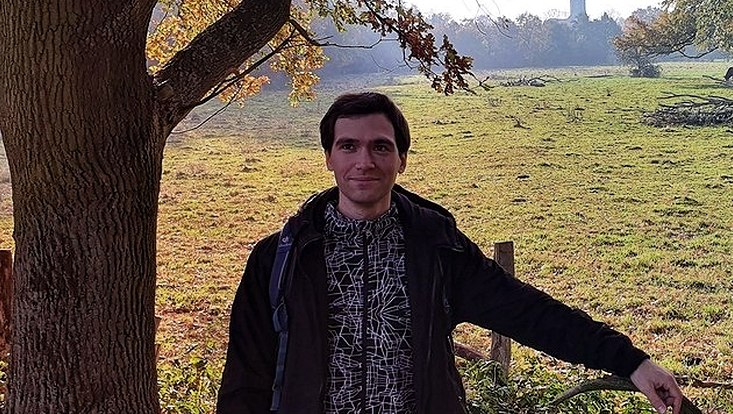Anton Sokolov
11 February 2021

Photo: E. Voilova
Anton Sokolov is from Saint Petersburg, Russia. He did his Master at the Department of Particle Physics and Cosmology at Moscow State University, where he graduated in June 2019. In his master thesis¹, he investigated possible particle physics solutions for the inconsistencies between existing theoretical models of the Sun and observational data. He says that from a scientific point of view, our Sun is a perfect astrophysical laboratory where a lot of particle physics models can be tested. Moreover, he is convinced that there will be a lot of new solar observational data from telescopes, satellites and neutrino observatories in the coming years and that these data can well trigger ground-breaking discoveries.
What is the topic of your research?
I am working now with Andreas Ringwald, who is also a supervisor of my PhD project. My research is centered around Weakly-Interacting Slim Particles (WISPs), such as axions, dark photons and others. In particular, in one part of my work I study the influence WISPs have on the physics of core-collapse supernovae: How can new physics trigger otherwise failed explosions and explain the occurrence of these spectacular events? In another part, I investigate if WISP hints from the observation of pulsars’ spectra can be reconciled with the data from CAST helioscope. Moreover, I research theoretical foundations of models of WISPs.
What fascinates you about your research focus?
In the field of particle physics, astrophysics and cosmology, we get a lot of experimental and observational data every year. The fascinating thing is that quite often these data seem to contradict our current understanding of the laws of physics, or even sometimes show us unambiguously that there is something beyond what humans have discovered so far. This means that the nature is still full of mysteries and basically, we do not understand who we are. Doing my research, I hope to understand better the world around me and probably in the end understand better myself.
What do you like about the cluster Quantum Universe?
I like much the basic idea of the cluster, which is to bring together scientists working on different topics. I enjoy QU Days and QU Lectures because there I get to know what others in the cluster do and how different branches of particle and mathematical physics develop.
What do you like to do in your free time?
In my free time, when there is no quarantine, I enjoy doing team sports, especially volleyball and football. One of my favorite activities is also hiking or cross-country skiing. During the pandemic, I usually go hiking somewhere close to Hamburg, play chess with friends or read books.
